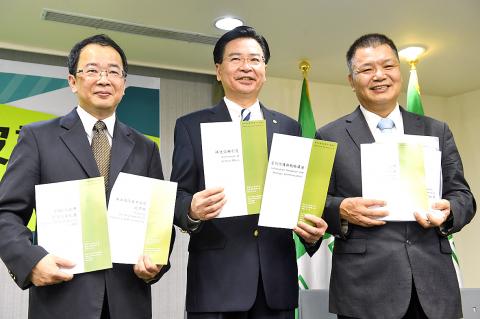The Democratic Progressive Party (DPP) released its defense policy paper yesterday, proposing to establish a cyberarmy as the fourth branch of the armed forces, along with focused investment and government support to develop the nation’s defense industry.
Other key recommendations in the 2015 Defense Policy Blue Paper include nurturing companies for the government’s indigenous submarine plan, merging the Veterans Affairs Council with the Ministry of National Defense and reassessing the all-volunteer military program.
DPP Secretary-General Joseph Wu (吳釗燮) said the nation needs to set up a cyberarmy to combat the daily “digital warfare” seen in cyberattacks from China.

Photo: George Tsorng, Taipei Times
The DPP’s Defense Policy Advisory Committee proposed establishing a cyberarmy by recruiting cybersecurity experts and young computer professionals, with an initial budget of NT$1 billion (US$32.56 million) and a “Cyberarmy Command Headquarters Office” that would integrate the functions and resources from the defense ministry’s “communications electronics and information,” “military intelligence and surveillance,” “digital warfare command” and “communications development” offices.
The party said the new branch would have commissioned officers and a command structure similar to the army’s, with active service obligations and benefits in line with the current branches.
Asked about the DPP’s proposal, defense ministry officials said the National Security Act (國家安全法) could be amended to enable existing units of the armed forces to defend the nation’s digital territory.
They also said that the military has in recent years adjusted its resources and recruiting to attract computing and electronic communications staff to enhance the nation’s overall cybersecurity, while the military employs cyberattack simulations during its digital warfare exercises.
Committee convener York Chen (陳文政) said the nation has the talent in science and engineering to obtain the technical know-how to advance toward the goal of a self-sufficient defense industry.
“An indigenous defense industry has a positive strategic impact on bolstering public confidence in, and support of, national defense,” the policy paper says.
DPP officials said Taiwan faces increasing difficulty in obtaining foreign arms because of China.
The policy paper says the government should seek international cooperation with its allies on new technologies so that it could eventually produce and maintain most of its weaponry and equipment.
It also says the defense ministry should encourage investment in the capacity for indigenous arms production.
“In the past, Taiwan’s defense ministry officials often headed to the US with shopping lists of weapons and military equipment to buy,” Wu said.
“That was the old approach. In the future, we will go to the US and tell them what our needs are and what are our weaknesses are. We will ask them to assist and upgrade our domestic defense sector in these areas,” he said.
The annual budget of the defense ministry should be stabilized at 3 percent of Taiwan’s GDP, Wu said.

Taiwan is projected to lose a working-age population of about 6.67 million people in two waves of retirement in the coming years, as the nation confronts accelerating demographic decline and a shortage of younger workers to take their place, the Ministry of the Interior said. Taiwan experienced its largest baby boom between 1958 and 1966, when the population grew by 3.78 million, followed by a second surge of 2.89 million between 1976 and 1982, ministry data showed. In 2023, the first of those baby boom generations — those born in the late 1950s and early 1960s — began to enter retirement, triggering

One of two tropical depressions that formed off Taiwan yesterday morning could turn into a moderate typhoon by the weekend, the Central Weather Administration (CWA) said yesterday. Tropical Depression No. 21 formed at 8am about 1,850km off the southeast coast, CWA forecaster Lee Meng-hsuan (李孟軒) said. The weather system is expected to move northwest as it builds momentum, possibly intensifying this weekend into a typhoon, which would be called Mitag, Lee said. The radius of the storm is expected to reach almost 200km, she said. It is forecast to approach the southeast of Taiwan on Monday next week and pass through the Bashi Channel

NO CHANGE: The TRA makes clear that the US does not consider the status of Taiwan to have been determined by WWII-era documents, a former AIT deputy director said The American Institute in Taiwan’s (AIT) comments that World War-II era documents do not determine Taiwan’s political status accurately conveyed the US’ stance, the US Department of State said. An AIT spokesperson on Saturday said that a Chinese official mischaracterized World War II-era documents as stating that Taiwan was ceded to the China. The remarks from the US’ de facto embassy in Taiwan drew criticism from the Ma Ying-jeou Foundation, whose director said the comments put Taiwan in danger. The Chinese-language United Daily News yesterday reported that a US State Department spokesperson confirmed the AIT’s position. They added that the US would continue to

The number of Chinese spouses applying for dependent residency as well as long-term residency in Taiwan has decreased, the Mainland Affairs Council said yesterday, adding that the reduction of Chinese spouses staying or living in Taiwan is only one facet reflecting the general decrease in the number of people willing to get married in Taiwan. The number of Chinese spouses applying for dependent residency last year was 7,123, down by 2,931, or 29.15 percent, from the previous year. The same census showed that the number of Chinese spouses applying for long-term residency and receiving approval last year stood at 2,973, down 1,520,